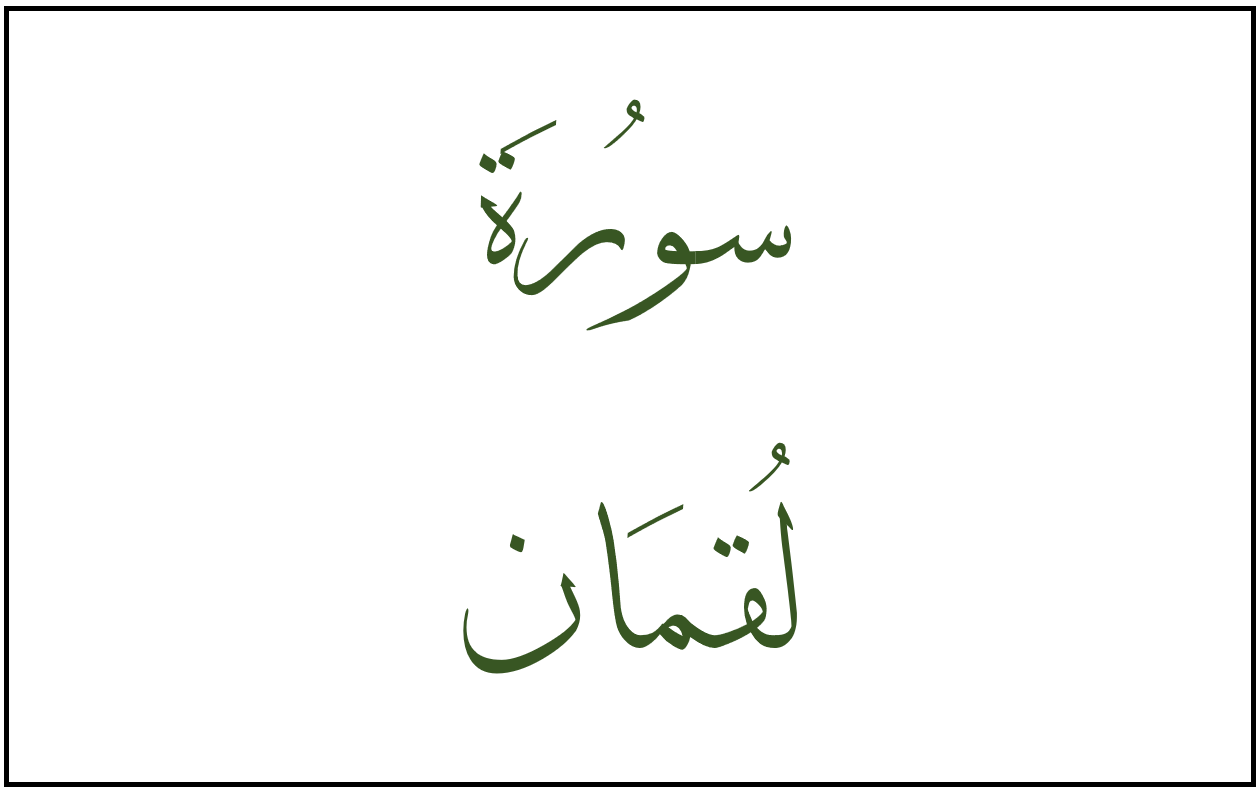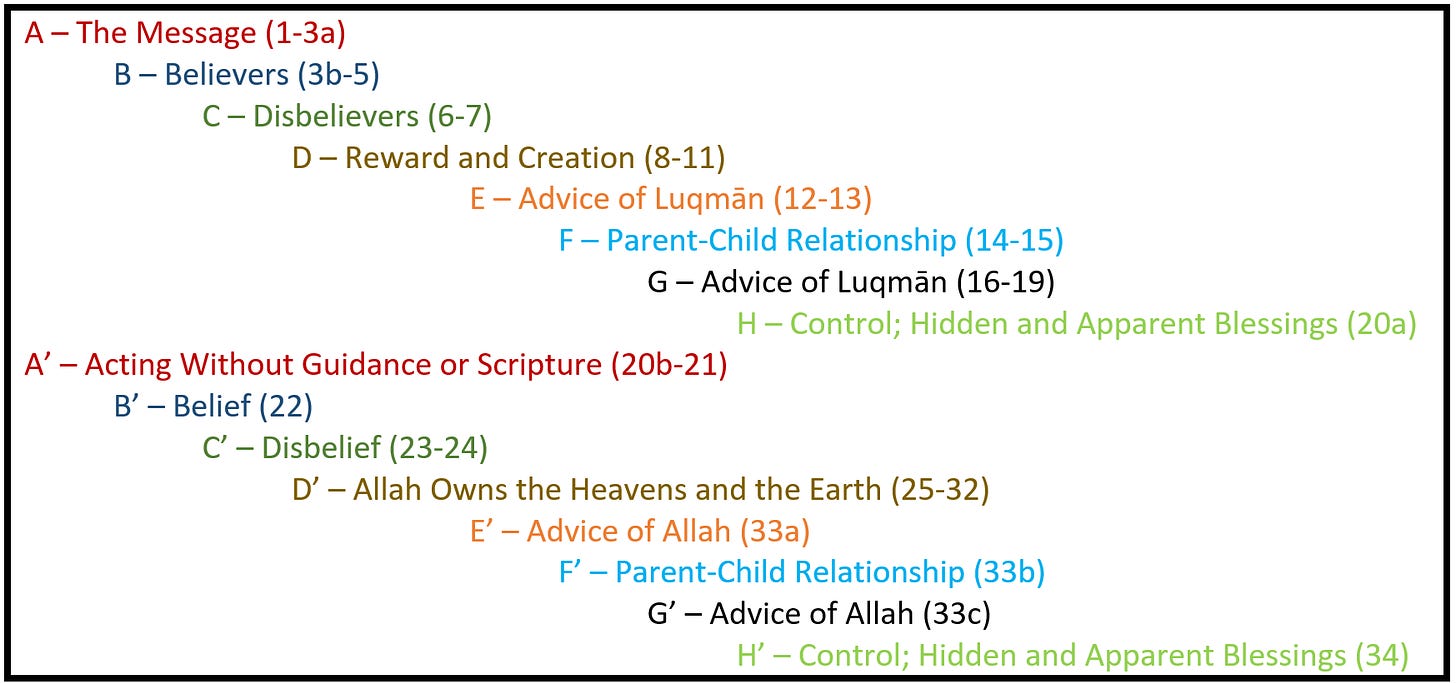

Discover more from Heavenly Order
Sūrah Luqmān (Luqmān) is a medium-length sūrah and 31st in the Quran’s compiled order. It gets its moniker from the mention of Luqmān the Wise and the sagacious advice he imparts upon his beloved son.
When the contents of the sūrah are laid out, it appears that it forms a large parallel structure. Please consult the original Arabic and translation before proceeding.
Connections
[A/A’] - The sūrah begins by describing the Quran as “al-kitāb al-ḥakīm (the Wise Scripture)” and a “hudan (guidance)”. The parallel āyāt speak of those who act without knowledge, “hudan (guidance)”, or “kitābin munīr (an enlightening scripture).” They reject guidance and would rather follow tradition, even if it means Satan guides them to the Fire.
[B/B’] - Allah ﷻ tells us that the Wise Scripture is for the “muḥsinīn (doers of good).” The āyāt proceed to describe those believers as people who establish prayer, pay their purifying dues, and believe unwaveringly in the unseen. The corresponding section describes the outcome of such belief. Those who submit wholeheartedly to Allah ﷻ, while he is a “muḥsin (doer of good),” will have successfully held on to the firm rope of Allah ﷻ.
[C/C’] - As is typically the case with the Quran, āyāt speaking of believers are immediately contrasted with the disbelievers. Allah ﷻ first describes them as people acting “without knowledge.” They will have an “ʿadhābun muhīn (humiliating punishment).” And on account of them making a mockery of the revelation, they are sarcastically “given the good news” of an “ʿadhābin alīm (painful punishment).” The latter section contrasts their lack of knowledge with Allah’s complete knowledge of “what their chests conceal.” And after being informed of their final abode earlier, here they are told that they will be “forced in” to the “ʿadhābun ghalīẓ (massive punishment).”
[D/D’] - Next come āyāt promising the believers a grand reward. A reward so massive that one may be skeptical of it. Allah ﷻ goes as far to say, “The promise of Allah is ḥaqq (true)” and that this reward is from none other than “Al-Aziz, Al-Ḥakīm (The Mighty, the Wise).” The rest of the section outlines Allah’s incredible creative ability and challenges the disbelievers to present anyone who can compete with the “khalq Allah (creation of Allah).” The corresponding section portrays the concession of the disbelievers. If asked “who created the skies and earth?” they respond, “Allah.” Here, not only does Allah ﷻ describe His amazing creations, but Allah ﷻ adds that He also owns it all, even repeating that He is “Al-Aziz, Al-Ḥakīm (The Mighty, the Wise).” Reflecting back, the reader should make the connection that the One who can create and own all this is more than capable of fulfilling His promise of a great reward. As Allah ﷻ says, “that’s because Allah alone is the Ḥaqq (Truth).”
[E/E’] - The relationship here is relatively straightforward. Section [E] highlights the wisdom of Luqmān and the advice he imparts upon his son. Luqmān warns, “Don’t associate partners with Allah. Undoubtedly, associating partners [with Allah] is a great wrong.” In contrast, Section [E’] is the “advice” (more accurately, guidance) that Allah ﷻ succinctly states as, “Mankind, be conscious of your Master!”, which compliments the advice of Luqmān well.
[F/F’] - Both sections here place a special emphasis on the parent-child relationship. Mankind is enjoined to act their best with wāliday-hi (his parents). But as much as they have done for us, we are taught not to obey them in matters of false theology. The linked passage tells us to “be weary of a Day when the wālid (parent) won’t be able to benefit their child,” nor vice versa. This drives home the message in the earlier passage. A believer should act respectful with their parents, but never to the detriment to their worship of Allah ﷻ alone, because obeying our parents instead of Allah ﷻ won’t benefit us on the Day of Judgment.
[G/G’] - Again we encounter the advice of Luqmān contrasted with the “advice” of Allah ﷻ. Luqmān’s man advice to his son spans such topics as the source of knowledge and provision, acts of worship, character traits, and manners. Complimentary to this is the guidance of Allah ﷻ wherein He warns us to not be deceived by the distractions of this life nor by the Deceiver (i.e., Satan).
[H/H’] - The final section is a beautiful parallel that demonstrates Allah’s complete control and how He manifests His blessings openly and subtly. Section [H] begins, “Have you not seen how Allah has subjugated, for you, whatever is in the heavens and whatever is in the earth?” Parallel to this is the beginning of Section [H’], “No doubt, Allah has the knowledge of the Hour, and He sends down rain and knows what is in the wombs.” Allah ﷻ created a sky for us that provides rain. And just as that rain cultivates the earth and brings hidden seeds to life, Allah ﷻ is equally aware of the hidden fetus growing in the womb. [H] continues, “[And how] He has lavished His favors upon you, both seen and unseen?” This arguably matches the end of the sūrah, “No soul knows what it will earn for tomorrow, and no soul knows in what land it will die.” Our provisions and how we earn them can be seen and recognized by us, but where we die will remain unknown until the last moment.
Summarized, Sections [H] and [H’] may be arranged as so:
والله أعلم - And Allah knows best
Sources
Personal notes and reflection






